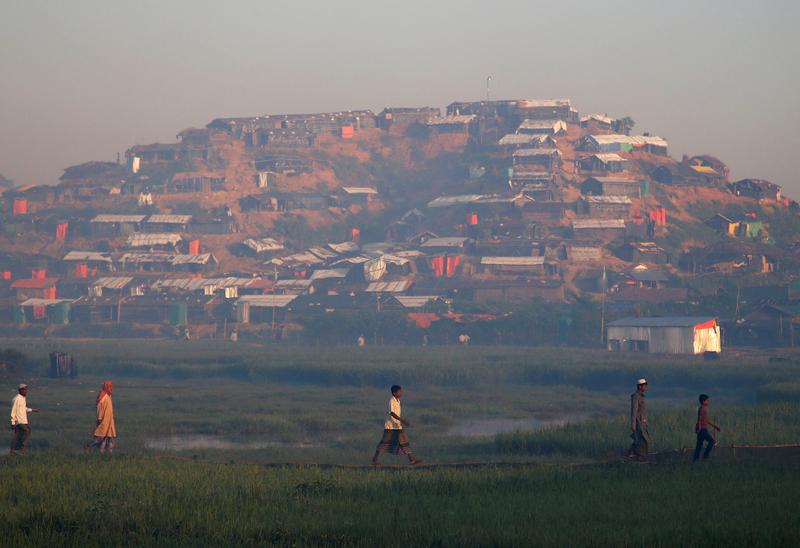Burma said on Wednesday that a UN Security Council statement on the Rohingya refugee crisis could “seriously harm” its talks with Bangladesh over repatriating more than 600,000 people who have fled there to escape a Burmese military crackdown.
The Security Council had urged Burma, in a statement on Monday, to “ensure no further excessive use of military force” and had expressed “grave concern over reports of human rights violations and abuses in Rakhine State.”
Responding, Burma’s de facto leader Aung Sang Suu Kyi, whose less than two-year-old civilian administration shares power with the military, said the issues facing Burma and Bangladesh could only be resolved bilaterally, a point she says was ignored in the Security Council statement.
“Furthermore, the [Security Council] Presidential Statement could potentially and seriously harm the bilateral negotiations between the two countries which have been proceeding smoothly and expeditiously,” Suu Kyi’s office said in a statement.
Negotiations with Bangladesh were ongoing, it said, and Bangladeshi Foreign Minister Abul Hassan Mahmood Ali had been invited to Burma from 16-17 November.
Bangladeshi officials said, however, that the earliest talks were likely to take place during the minister’s visit for a regional meeting in the Burmese capital Naypyidaw on 20 and 21 November.
A senior Bangladesh foreign ministry official said the United Nations should be involved in the process to resolve the recurring problem of fleeing Rohingya.
“For years, we tried to resolve this issue bilaterally with Myanmar, but it was in vain,” the official told Reuters. “This problem is not going to be resolved anytime soon. The UN’s involvement in the process is a must.”
A sour note was struck over the talks last week, as Bangladesh officials voiced outrage over Suu Kyi’s spokesman casting suspicion that Bangladesh might drag its feet over agreeing to the repatriation process in order to first secure hundreds of millions of dollars in international aid money.
Speaking at a conference for Commonwealth countries’ parliamentarians in Dhaka on Sunday, Bangladeshi Prime Minister Sheikh Hasina called for more international pressure on Burma.
“I would request all of you to discuss Rohingya issue with utmost priority and exert pressure on the Myanmar government to stop the persecution of its citizens and take them back at the earliest,” she said.
US Secretary of State Rex Tillerson is due to visit Burma on 15 November, with moves afoot in Washington to bring a bill calling for sanctions on Burma that specifically target the military and related business interests.
In a nod to China, the statement from Burma’s Ministry of the Office of the State Counsellor said it appreciated the stand taken by some members of the Security Council who upheld the principle of non-interference in the internal affairs of sovereign countries.
To appease council veto powers Russia and China, Britain and France dropped a push for the Security Council to adopt a resolution on the situation and the 15-member body instead unanimously agreed on a formal statement.
The United Nations has denounced the violence during the past 10 weeks as a classic example of ethnic cleansing to drive Rohingya Muslims out of Buddhist-majority Burma.
Rejecting that accusation, the military says its counter-insurgency clearance operation was provoked by Rohingya militants’ synchronised attacks on 30 security posts in the northern part of Rakhine State on 25 August.
Rohingya refugees say the military torched their villages, but the military says the arsonists were Rohingya militants. The refugees have given harrowing accounts of rape and murder. Burma says those accusations will have to be investigated.
In the meantime, the exodus from Rakhine State continues. Several thousand Rohingya reached Bangladesh last week, many of them wading through shallows of the Naf River on the boundary between the two countries, and some making a short but perilous sea crossing in small boats.
On Tuesday, Bangladesh border guards told Reuters of at least two more boats reaching Cox’s Bazar, bringing 68 more Rohingya to join the hundreds of thousands who have taken shelter in refugee camps there.
Suu Kyi, a stateswoman lionised as a Nobel Peace Prize winner for defying the junta that ruled Burma for decades, has been pilloried abroad for not speaking out more forcefully to rein in the military.
Last week she went to Rakhine for the first time since the crisis erupted, and met with community leaders and saw what efforts were being made to deliver aid and return the region to some semblance of normality.
[related]
She has spoken of plans to open repatriation processing centres, where the refugees will have to prove they were once resident in Rakhine before being allowed to return.
Having been classed as stateless by the military junta that ruled Burma for decades, Rohingya could struggle passing the repatriation test.
During recent weeks, authorities began issuing “national verification cards” to people in northern Rakhine. Remaining Rohingya have been reluctant to accept these cards as they do not guarantee citizenship, and would effectively treat them as new immigrants.



